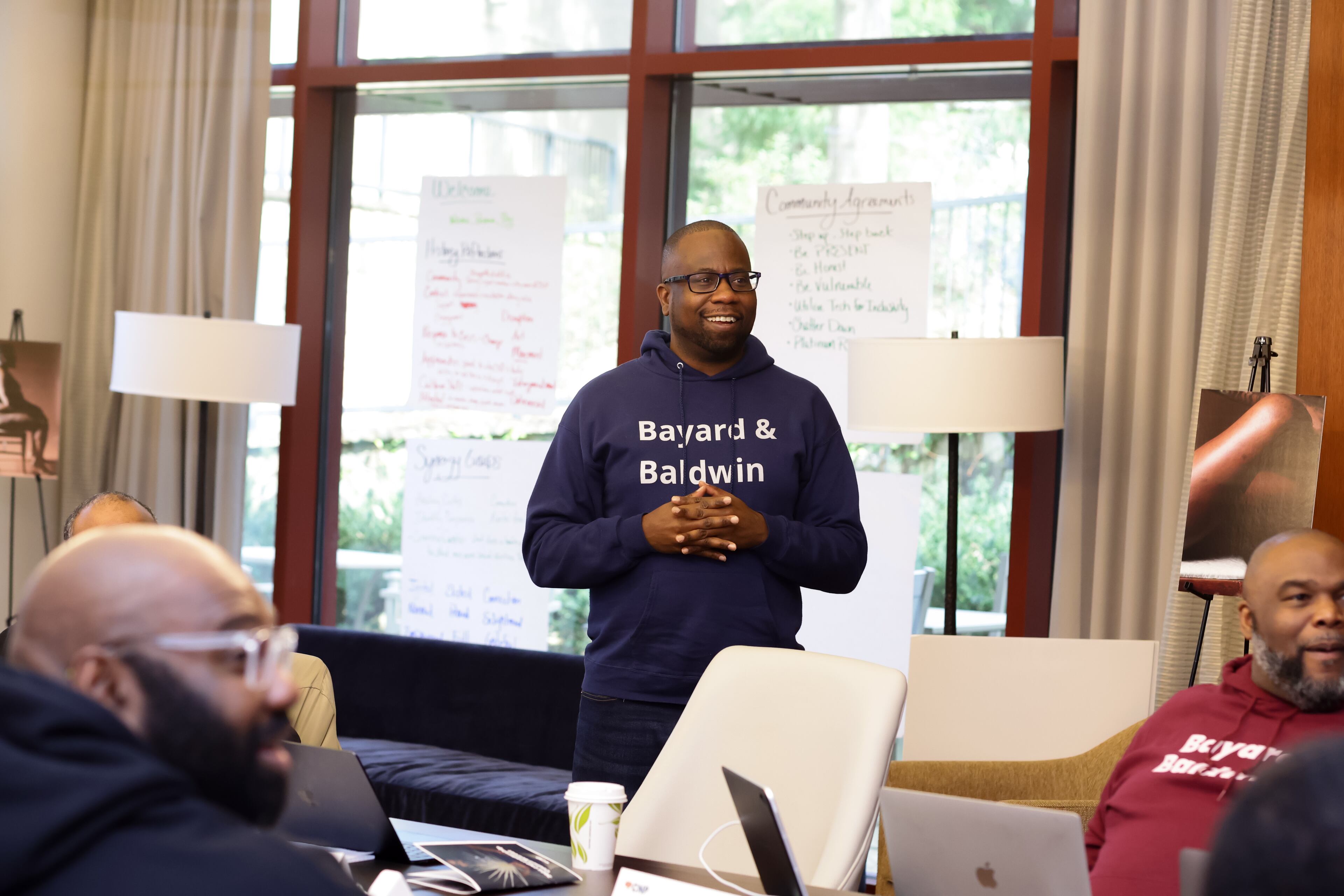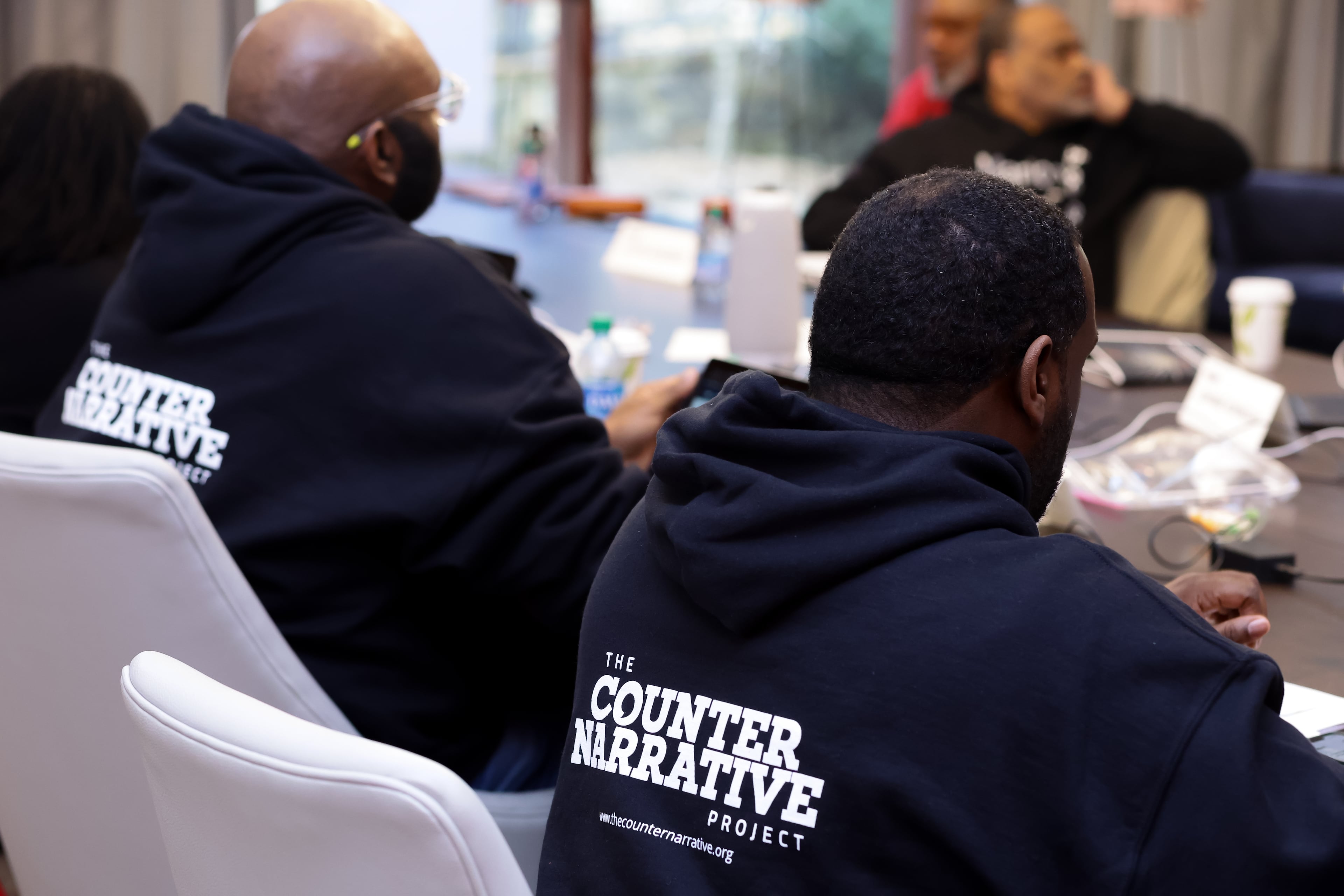Counter Narrative Project celebrates writer James Baldwin’s 100th birthday

The Counter Narrative Project, the advocacy organization that seeks to change narratives around Black LGBTQ men that influence policy, is hosting James Baldwin and Atlanta to celebrate what would’ve been the writer-activist’s 100th birthday Friday at The Gathering Spot.
Led by Charles Stephens, founder and executive director of The Counter Narrative Project, the 90-minute event is a live conversation with author-community organizer Kimberly Latrice Jones. It will explore how the openly gay author and Civil Rights icon who wrote “The Fire Next Time,” “Go Tell It on the Mountain” and other seminal works of literature inspired their work.
The dialogue will also revisit the eloquent essayist and social critic’s connections to Atlanta, and how the city shows up in his literary works.

Stephens said he wants James Baldwin and Atlanta to become a think tank that encourages others to speak unapologetically about issues important to them.
“He was honest, candid, unflinching, and had the courage and resilience to speak truth to power,” Stephens said. “This is a love letter to James Baldwin and a program that could speak to this unique perspective he has through his connections here.”
Baldwin wrote about Atlanta in “Journey to Atlanta,” an essay featured in his 1955 collection “Notes of a Native Son,” about his two brothers’ experiencing prejudice in the South as part of a gospel quartet. Growing up in Harlem, New York, he first visited Atlanta in 1957 as part of a tour covering race in the Deep South for Harper’s Magazine. It would be the first of several trips he would continue to make until his death in 1987.

The writer mentioned Atlanta in the title essay for his 1961 collection, “Nobody Knows My Name,” and used the city as a backdrop for a same-gender-loving relationship in his final novel, “Just Above My Head,” in 1979.
“The Evidence of Things Not Seen,” Baldwin’s essay in Playboy magazine which became a book in 1985, gave brow-raising observations of the Atlanta Child Murders as an attack on Black communities. Stephens, whose cousin was one of the missing 28 children, said he created the event to reintroduce audiences to the book’s views on race, power, capitalism and white supremacy.

“Baldwin’s voice didn’t really get brought to that citywide conversation very much. It’s such a missed opportunity because his perspective would’ve brought some really important issues to the forefront and given us some of the language to grapple with complicated feelings we have,” he said.
This year is the 10th anniversary of The Counter Narrative Project. Headquartered in Candler Park, the organization was created following the death of Michael Brown in Ferguson, Missouri. It was built on the philosophies of Black gay male writers and thinkers like Baldwin, Bayard Rustin and Essex Hemphill, who used storytelling and open dialogue to drive social change and humanize Black queer men.

The Counter Narrative Project publishes a digital magazine, The Reckoning, and has a Narrative Leadership Institute that produces labs and workshops for podcasting, documentary filmmaking, content creation, poetry and playwriting.
Stephens, who grew up in Adamsville, originally started the nonprofit as a platform to write, organize and shift paradigms on Black-led LGBTQ advocacy groups, calling Baldwin “his North Star.”

“Storytelling and narrative shifting are indispensable to social change because bad narratives create bad policies. Baldwin gives us the seeds for change using a narrative strategy,” Stephens said.
“The organizations that I care about deeply were often found from a place of trauma, crisis, in response to harm and pain. I was curious about what it would be like to create something out of love, sacred space and memories that empower us, make us feel special, seen and heard.”
Jones was introduced to Counter Narrative Project after seeing one of its plays in 2018. She co-authored “I’m Not Dying With You Tonight,” a young adult novel published in 2019 told from the perspectives of two teenage girls, one Black and one white.

A native of Southside Chicago now based in Atlanta, Jones said she thought about Baldwin’s authenticity in his writing anytime critics expressed their issues with the book’s subject matter.
“I chose to write the character as herself, unapologetically,” she said. I don’t write for the white gaze. I write for the girls in West End, Zone 6, Harlem and Brooklyn.”
In 2020, Jones went viral after the death of George Floyd with “How Can We Win,” her six-minute lament on how systemic racism and economic injustice fuels protests and uprising in Black communities. That video was adapted into a book, “How Can We Win: Race, History and Changing the Money Game That’s Rigged,” in 2022.
Stephens invited Jones to participate in James Baldwin and Atlanta after seeing her testimonial on the back cover of the reissue of “The Evidence of Things Not Seen.” She moderated one of the group’s events with author George Johnson at Auburn Avenue Research Library earlier this year.
He said her writing and activism echoes Baldwin’s ideology. “She’s part of that large legacy that he left,” he said.
Stephens said he hopes James Baldwin and Atlanta will motivate the audience to revisit his work and figure out how to become productive citizens.
“People need joy and a sense of community. This allows us to commemorate the words and legacies of people that we still learn from,” he said.
“Baldwin is one of the greatest writers and activists of the 20th century, if not all-time. If he could stir within me a sense of hope and personal agency, then he can certainly do that for many others.”
7 p.m. Friday, Aug. 2, 2024. The Gathering Spot, 384 Northyards Boulevard NW, Atlanta. 404-948-2459. https://www.eventbrite.com/e/james-baldwin-atlanta-tickets-925231942647
Sign up for the UATL newsletter.
Read more stories like this by liking UATL on Facebook and following @itsUATL on X and Instagram.


